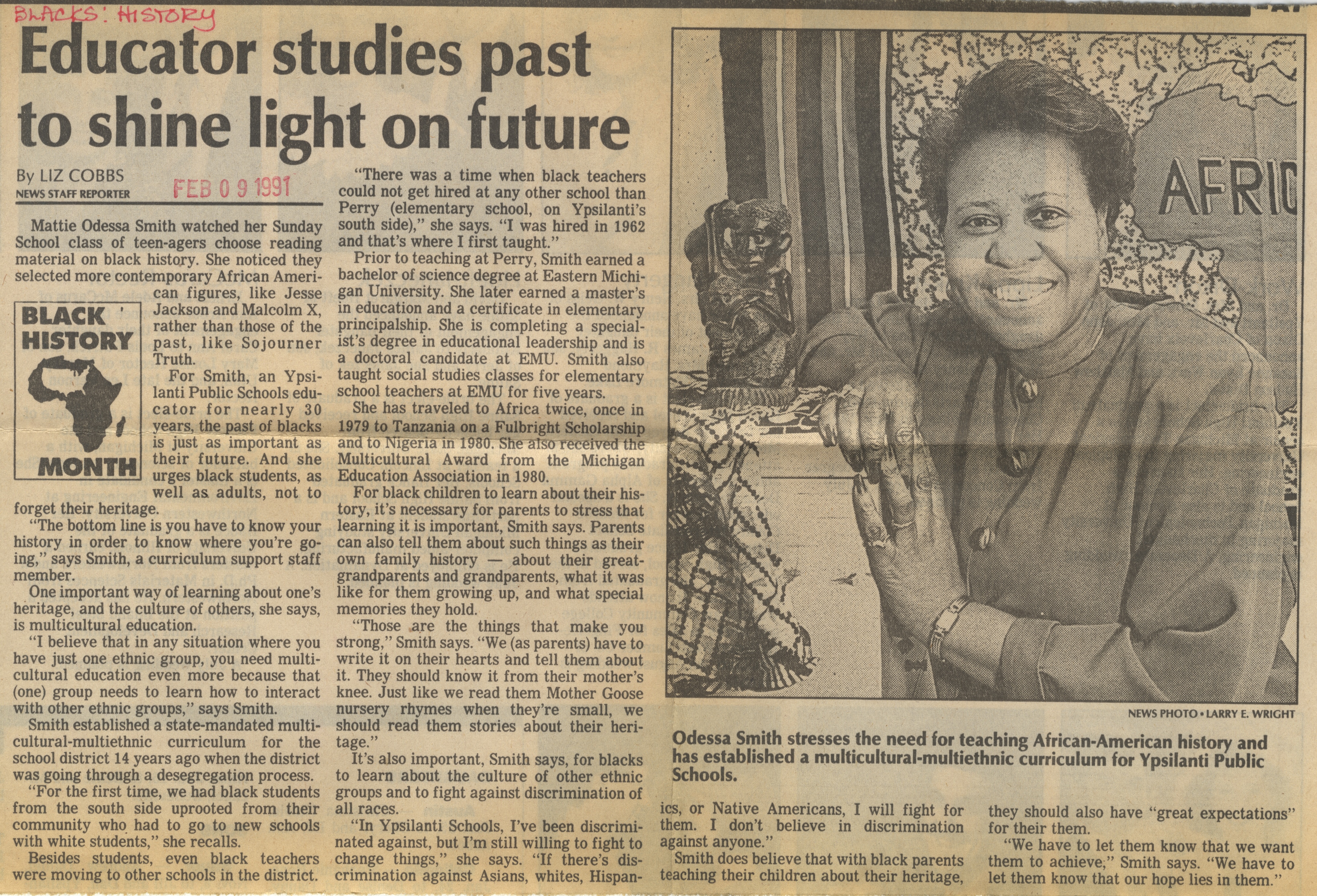Educator Studies Past To Shine Light On Future

Educator studies past to shine light on future
By LIZ COBBS
NEWS STAFF REPORTER
Mattie Odessa Smith watched her Sunday School class of teen-agers choose reading material on black history. She noticed they selected more contemporary African American figures, like Jesse Jackson and Malcolm X, rather than those of the past, like Sojourner Truth.
For Smith, an Ypsilanti Public Schools educator for nearly 30 years, the past of blacks is just as important as their future. And she urges black students, as well as adults, not to forget their heritage.
“The bottom line is you have to know your history in order to know where you’re going,” says Smith, a curriculum support staff member.
One important way of learning about one’s heritage, and the culture of others, she says, is multicultural education.
“I believe that in any situation where you have just one ethnic group, you need multicultural education even more because that (one) group needs to learn how to interact with other ethnic groups,” says Smith.
Smith established a state-mandated multicultural-multiethnic curriculum for the school district 14 years ago when the district was going through a desegregation process.
“For the first time, we had black students from the south side uprooted from their community who had to go to new schools with white students,” she recalls.
Besides students, even black teachers were moving to other schools in the district.
“There was a time when black teachers could not get hired at any other school than Perry (elementary school, on Ypsilanti’s south side),” she says. “I was hired in 1962 and that’s where I first taught.”
Prior to teaching at Perry, Smith earned a bachelor of science degree at Eastern Michigan University. She later earned a master’s in education and a certificate in elementary principalship. She is completing a specialist’s degree in educational leadership and is a doctoral candidate at EMU. Smith also taught social studies classes for elementary school teachers at EMU for five years.
She has traveled to Africa twice, once in 1979 to Tanzania on a Fulbright Scholarship and to Nigeria In 1980. She also received the Multicultural Award from the Michigan Education Association in 1980.
For black children to learn about their history, it’s necessary for parents to stress that learning it is important, Smith says. Parents can also tell them about such things as their own family history — about their great-grandparents and grandparents, what it was like for them growing up, and what special memories they hold.
“Those are the things that make you strong,” Smith says. “We (as parents) have to write it on their hearts and tell them about it. They should know it from their mother’s knee. Just like we read them Mother Goose nursery rhymes when they’re small, we should read them stories about their heritage.”
It’s also important, Smith says, for blacks to learn about the culture of other ethnic groups and to fight against discrimination of all races.
“In Ypsilanti Schools, I’ve been discriminated against, but I’m still willing to fight to change things,” she says. “If there’s discrimination against Asians, whites, Hispanics, or Native Americans, I will fight for them. I don’t believe in discrimination against anyone.”
Smith does believe that with black parents teaching their children about their heritage, they should also have “great expectations” for their them.
“We have to let them know that we want them to achieve,” Smith says. “We have to let them know that our hope lies in them.”
BLACK HISTORY MONTH
NEWS PHOTO - LARRY E. WRIGHT
Odessa Smith stresses the need for teaching African-American history and has established a multicultural-multiethnic curriculum for Ypsilanti Public Schools.
Article
Subjects
Liz Cobbs
Ypsilanti Public Schools - Faculty & Staff
Perry Elementary School (Ypsilanti)
Multicultural Education
Multicultural Award
Michigan Education Association (MEA)
Fulbright scholarship
Eastern Michigan University - Faculty & Staff
Eastern Michigan University - Alumnus
Black History
Black American Community
LOH Education
Has Photo
Old News
Ann Arbor News
Sojourner Truth
Mattie Odessa Smith
Malcolm X
Jesse Jackson
Larry E. Wright